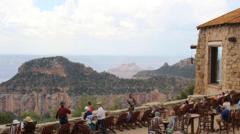The picturesque town of Pahalgam struggles to revive its tourism sector after a deadly attack that killed 26 people. Despite growing tensions and fears of ongoing violence, some visitors are slowly returning, hoping to support the local economy while grappling with apprehension about safety.
Resilience and Reluctance: Tourists Gradually Return to Pahalgam Post-Attack

Resilience and Reluctance: Tourists Gradually Return to Pahalgam Post-Attack
A week after a tragic militant attack, Pahalgam sees a cautious return of tourists, but fear and uncertainty loom large.
One week after a devastating militant attack that resulted in the deaths of 26 individuals near Pahalgam, a renowned mountain resort in Indian-administered Kashmir, the area shows signs of tentative recovery with some tourists returning. The tranquil high street, which was deserted following the tragedy, is now experiencing brief moments of vitality, as visitors trickle back to this once-thriving destination.
The violent incident, which occurred when militants opened fire on tourists in Baisaran, has left a profound impact on the community. Pahalgam, often referred to as the "Switzerland of India," is now grappling with heightened tensions between India and Pakistan, both of which lay claim to Kashmir, leading to an increase in retaliatory measures from both governments.
As local authorities close more than half of the tourist spots and conduct security reviews, both residents and business owners express anxiety over the long-term implications for jobs and income. The area heavily relies on tourism, and fears persist that lasting damage may have been inflicted on local livelihoods.
Despite the turmoil, some tourists, like Akshay Solanki from Mumbai, were compelled to stay due to inflated flight costs, while others took comfort from the reassuring presence of security personnel and locals. Rafi Ahmed, a shawl vendor, voiced concerns for his future, acknowledging the rarity of such brazen violence affecting tourists and lamenting the possible decline in visitor numbers.
Encouragement from well-known figures, including actor Atul Kulkarni, who implored tourists to continue their travel plans to Pahalgam, provided some motivation to mitigate the fears instigated by the attack. Yet, the looming sense of unease remains palpable.
Omar Abdullah, the chief minister of Jammu and Kashmir, publicly mourned the victims, expressing his sorrow over the attack and the insecurity that now overshadows the region. Reports indicate that cancellations of travel bookings have surged, with tour operators estimating that up to 90% of reservations have been disrupted.
The recent violence has also derailed plans for significant projects in Kashmir, such as the inauguration of a major rail bridge intended to enhance regional connectivity.
As the community attempts to heal, and local leaders express solidarity with families of victims, uncertainty continues to overshadow Pahalgam's tourist industry. Businesses and residents are framed in a waiting game, hoping that peace will prevail, and tourists will return in large numbers, but reality suggests a long road ahead towards recovery.


















